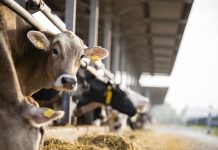The UK government is doubling funding for farm inspections to curb agricultural pollution and strengthen environmental protection efforts
To address growing concerns about agricultural pollution, the UK government has announced a substantial increase in funding for the Environment Agency’s farm inspections. This move is part of a broader strategy to support farmers in adopting greener practices and protecting the nation’s natural resources.
The announcement follows a meeting led by Farming Minister Daniel Zeichner and Water Minister Emma Hardy. They met with various groups to launch a new programme aimed at clarifying and improving farming regulations to help reduce and prevent pollution from farms.
Helping farmers meet high environmental standards
Agricultural pollution is one of the leading causes of poor water quality in the UK, affecting biodiversity, harming aquatic life, and contributing to the decline of vital ecosystems. Runoff from fertilisers, pesticides, and livestock waste can lead to nutrient pollution, causing algal blooms and degrading habitats. Addressing this issue is crucial not only for the health of the environment but also for public health and the long-term sustainability of the agricultural sector. By addressing pollution at its source, the government is supporting a cleaner, greener future while reinforcing the UK’s commitment to environmental protection and climate resilience.
Farmers will receive more financial support to help them meet high environmental standards. The funding boost will enable the Environmental Agency to provide more guidance to farmers, strengthen its links with supply chains and farm networks, utilise technology such as remote sensing more effectively, and take more decisive action against severe or ongoing pollution.
The new funding will see around 6,000 inspections a year by 2029. This additional boost builds upon the £11.8 billion investment in sustainable farming, alongside actions to protect pollinators, including the banning of bee-harming pesticides and the publication of the first Pesticides National Action Plan in a decade.
The Environmental Agency, as the regulatory body, sends officers to farms to check compliance with environmental law. If the laws are broken, farmers must rectify the issues and are given a written deadline as part of the enforcement process. This encourages farms to follow rules that protect rivers, air, and wildlife whilst also supporting sustainable food production.
Environment Secretary Steve Reed said: “Farmers are key partners in protecting our rivers, lakes, and seas – and through our Plan for Change we’re backing them to do just that.
By doubling funding for inspections, we’re ensuring that farmers receive better advice to help them reduce pollution and clean up our water ways for good.”
Thousands of measures taken to protect the environment
In 2024/25, 6,242 actions were completed, including improvements in fertiliser use, slurry storage, and soil testing. These changes help the environment and save farmers money. The 4,545 farm inspections last year are expected to bring even more benefits.
Inspections are prioritised at farms that present the highest risk to water quality, such as farms in areas where rivers or groundwater have already been affected by agricultural activity.
Agency Chief Executive Philip Duffy said: “Our role is to protect people and the environment, which is why we are tackling all sources of water pollution, whether it’s from agriculture, the water industry or road.
Many farmers share our desire for cleaner waterways and are already taking significant steps to reduce pollution and improve their environmental standards. This increased support will help them do even more to achieve the same goal.
Our approach means farmers receive clear advice and practical steps, but where necessary we can and will take enforcement action.”











